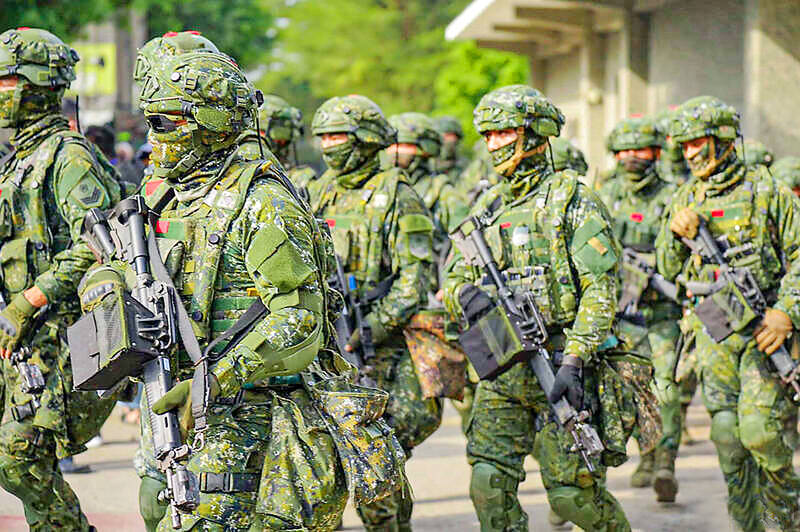The Ministry of National Defense is building dedicated training ranges and simulated environments to facilitate troop familiarity with incoming military platforms and prepare them for urban combat situations and nuclear, biological and chemical warfare, according to a budget proposal it submitted to the legislature late last month.
The ministry has allocated NT$20 million (US$621,350) of the military’s budget for next year to the program, of which NT$9.24 million would be used to construct training grounds to simulate urban combat and nuclear, biological and chemical warfare.
The construction projects are expected to be concluded by 2026, the budget proposal said.

Photo: Huang Chin-hsuan, Taipei Times
The army said an additional NT$12.91 billion, allotted for next year and 2026, would go toward building light-weapons training ranges and provide sufficient ranges to adequately train soldiers.
The ranges would be equipped with state-of-the-art monitoring systems to assist soldiers with posture and accuracy, it said.
In addition, the army’s 203rd Brigade and 104th Brigade have also built a training range for grenade throwing and anti-armor training, it said.
Four new training grounds would also be built to improve the mental fortitude of soldiers, the army said, adding that it is also creating facilities to help serving and reservist forces adjust to high-pressure environments.
Separately, the ministry’s national military museum project, which has been under construction since 2015, is expected to be completed next year.
The museum would replace the now-shuttered Republic of China Armed Forces Museum.
The Executive Yuan originally approved a NT$4.62 billion budget for the program, but the ministry included extra budget items from 2021 through next year to purchase archiving and research equipment totaling NT$839 million, bringing the total project budget to NT$5.34 billion.
The seven-story building, with three levels underground, is expected to be completed by Aug. 18 next year.
Ricky Liu and Associates designed the building, with Ricky Liu (劉培森) as the chief architect, while Hung Sheng Construction and Co, managed by Kuo Pei-hung (郭倍宏), was brought on for the construction.
Additional reporting by CNA

US President Donald Trump said "it’s up to" Chinese President Xi Jinping (習近平) what China does on Taiwan, but that he would be "very unhappy" with a change in the "status quo," the New York Times said in an interview published yesterday. Xi "considers it to be a part of China, and that’s up to him what he’s going to be doing," Trump told the newspaper on Wednesday. "But I’ve expressed to him that I would be very unhappy if he did that, and I don’t think he’ll do that," he added. "I hope he doesn’t do that." Trump made the comments in

NOT AN OPENING: Trump’s violation of international law does not affect China’s consideration in attacking Taiwan; Beijing lacks capability, not precedent, an official said Taiwanese officials see the US’ capture of the president of Venezuela as a powerful deterrent to Beijing’s aggression and a timely reminder of the US’ ability to defeat militaries equipped with Chinese-made weapons. The strikes that toppled Venezuelan President Nicolas Maduro signaled to authoritarian leaders, including Chinese President Xi Jinping (習近平), US President Donald Trump’s willingness to use military might for international affairs core to US interests, one senior official in Taipei’s security circle said. That reassured Taiwan, the person said. Taipei has also dismissed the idea that Trump’s apparent violation of international law could embolden Beijing, said the official, who was not

A cold surge advisory was today issued for 18 cities and counties across Taiwan, with temperatures of below 10°C forecast during the day and into tonight, the Central Weather Administration (CWA) said. New Taipei City, Taipei, Taoyuan and Hsinchu, Miaoli and Yilan counties are expected to experience sustained temperatures of 10°C or lower, the CWA said. Temperatures are likely to temporarily drop below 10°C in most other areas, except Taitung, Pingtung, Penghu and Lienchiang (Matsu) counties, CWA data showed. The cold weather is being caused by a strong continental cold air mass, combined with radiative cooling, a process in which heat escapes from

Snow this morning fell on Alishan for the first time in seven years, as a strong continental cold air mass sent temperatures plunging across Taiwan, the Central Weather Administration (CWA) said. The Alishan weather station, located at an elevation of about 2,200m in central Taiwan, recorded snowfall from 8:55am to 9:15am, when the temperature dropped to about 1°C, the CWA said. With increased moisture and low temperatures in the high-altitude Alishan area, the conditions were favorable for snow, CWA forecaster Tsai Yi-chi (蔡伊其) said. The last time snow fell at the Alishan weather station was on Jan. 10, 2018, while graupel fell there